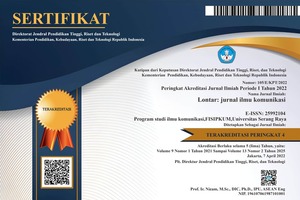Komodifikasi Dangdut Empat Generasi di Televisi
(Analisis Perluasan Pasar Media)
DOI:
https://doi.org/10.30656/lontar.v8i1.1546Abstract
The aim of this study is to provide readers insight into the practice of capitalism in the television industry, as their efforts seek profits through the expansion of the media market. Especially the practice of capitalism, which is represented by television content creators, in commodifying dangdut through program that are aired. To facilitate analysis, the author divides the study into four generations, namely monopoly, oligopoly, monopolistic compet ition, and perfect competition, which is related to the audience market and the advertiser's market. The approach used is qualitative with a critical paradigm, and historiography method. Data from interviews result of informants involved in the dangdut industry on television, participation observation, personal source documentation and the internet, the authors of the analysis to answer the purpose of this study. The result was found that in diffrent ways in each generation, dangdut as a culture of society was made commodity by television capitalists. The way through various genres of programs that are aired, they are looking for profits to expand the audience market and advertisers. Not only that, they also use television to spread their influence in society, to maintain their dominant position in the social order.References
REFERENSI
Albarran, A. B. (2010). The Media Economy. 270 Madison Avenue, New York, NY 10016: Routledge.
Baran, S. J., & Davis, D. K. (2010). Teori komunikasi massa: dasar, pergolakan, dan masa depan (5th ed., cetakan ketujuh). (Afrianto Daud dan Putri Iva Izzati, Trans). Jakarta: Salemba Humanika.
Denzin, N. K., & Lincoln, Y. S. (2009). Handbook of Qualitative Research (Dariyatno dkk, Trans). Yogyakarta: Pustaka Pelajar.
Fiske, J. (2011). Memahami Budaya Populer (cetakan 1) (Asma Bey Mahyuddin, Trans). Yogyakarta: Jalasutra.
Grant, August E; Meadows, Jennifer H. (Eds.). (2012). Communication Technology Update and Fundamentals (13th ed.). 225 Wyman Street, Waltham, MA 02451, USA: Focal Press.
Ibrahim, I. S. (2007). Budaya Populer sebagai Komunikasi, Dinamika Popscape dan Mediascape di Indonesia Kontemporer (cetakan 1). Yogyakarta: Jalasutra.
Ibrahim, I. S., & Akhmad, A. B. (2014). Komunikasi dan Komodifikasi, Mengkaji Media dan Budaya dalam Dinamika Globalisasi. Jakarta: Yayasan Pustaka Obor Indonesia.
Littlejohn, S., & Foss, K. (2009). Teori Komunikasi, Theories of Human Communication (9th ed.). (Mohammad Yusuf Hamdan, Trans). Jakarta: Salemba Humanika.
McQuail, D. (2011). Teori Komunikasi Massa (6th ed.) (Putri Iva Izzati, Trans). Jakarta: Salemba Humanika.
Mosco, V. (2009). The Political Economy of Communication (2nd ed.). London : SAGE Publications Ltd .
Pringle, P. K., & Starr, M. F. (2006). Electronic Media Management. Burlington, MA 01803, USA : Elsevier.
Salim, A. (2001). Teori dan Paradigma Penelitian Sosial (Pemikiran Norman K Denzin & Egon Guba, dan Penerapannya) Cetakan Pertama. Yogyakarta: Tiara Wacana Yogya.
Sarwono, A. (2009). Rekor Rekor MURI. Jakarta: Elex Media Komputindo.
Tassel , J. V., & Howfield, L. P. (2010). Managing Electronic Media, Making, Marketing, and Moving Digital Content. Burlington, MA 01803: Elsevier Inc.
Weintraub, A. N. (2012). Dangdut : Musik, Identitas, dan Budaya Indonesia (cetakan pertama) (Arif Bagus Prasetyo, Trans). Jakarta: KPG (Kepustakaan Popular Gramedia).
Wawancara
Alex Aman Chalik – produser TPI, tggl 18 Juli 2018
Marah Bangun – Executive Produser TPI, tggl 15 Desember 2018
Oya Uktolseja - Direktur Orange Production, tggl 12 Desember 2018
Internet
https://radiocbb1054fm.wordpress.com/, diakses tggl 14 Maret 2019
https://www.mersifm.com/, diakses tggl 14 Maret 2019
http://rdifm.co.id/, diakses tggl 14 Maret 2019
https://www.1034dfm.com/, diakses tggl 14 Maret 2019
https://www.flickr.com/photos/29215264@N02/2939966275/, diakses 14 Maret 2019
http://forum.detik.com/stasiun-tv-yang-pantas-ditutup-t37659p39.html, diakses tggl 4 Januari 2019
Astuti , P. H. (2016, Oktober 09). Daftar Lengkap Peserta 6 Negara di D`Academy Asia 2. Retrieved from https://www.liputan6.com/showbiz/read/2621876/daftar-lengkap-peserta-6-negara-di-dacademy-asia-2, diakses tggl 24 Mei 2019.
Elmira, P. (2017, Oktober 20). 5 Fakta Penyelenggaraan Dangdut Academy Asia 3. Retrieved from bintang.com: https://www.bintang.com/celeb/read/3134803/5-fakta-penyelenggaraan-dangdut-academy-asia-3/page-6, diakses tggl 7 Juni 2018.
Putri, F. S. (2018, Mei 8). BBC. Retrieved from https://www.bbc.com/indonesia/trensosial-44021009, diakses tggl 13 November 2018.
Dokumentasi
Zakaria, Dokumentasi Pribadi: Perjalanan Karier Zakaria dalam Dunia Musik Melayu/Dangdut sejak 1957 sampai sekarang ini, Jakarta.
Downloads
Published
Issue
Section
License
By submitting an article to the journal, the author(s) agree to transfer the published article's copyright to the journal, which will act as the publisher. This means the journal will have the right to publish the article in various forms, including reprints. The journal will maintain the publishing rights to the published articles.
In line with the license, authors and third parties (readers, researchers, and others) are allowed to share and adapt the material. In addition, the material must be given appropriate credit, provided with a link to the license, and indicated if changes were made. If authors remix, transform, or build upon the material, authors must distribute their contributions under the same license as the original.






